Richest Financial Traders In South Korea
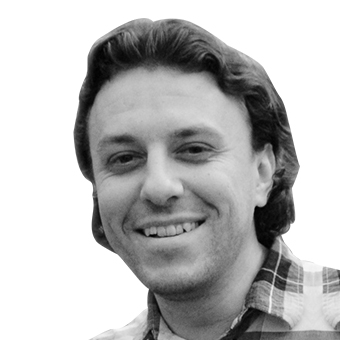


Editorial Note: While we adhere to strict Editorial Integrity, this post may contain references to products from our partners. Here's an explanation for How We Make Money. None of the data and information on this webpage constitutes investment advice according to our Disclaimer.
Top Forex traders in South Korea:
Michael B. Kim – co-founder of MBK Partners, he strategically leverages macroeconomic trends for FX and asset diversification.
Cho Jung-ho – founder of Meritz Financial Group, known for conservative yet effective currency risk management in portfolio allocation.
Park Hyeon-joo – pioneer in South Korea’s asset management scene, occasionally integrates Forex into structured investment products.
Rogue Trader – an anonymous figure in Korean trading circles, known for aggressive leveraged positions and high-volatility FX scalping.
South Korea’s Forex market is shaped by a select group of highly skilled traders whose decisions influence short-term price dynamics and overall liquidity. These individuals rely on advanced technical strategies, deep experience in volatile conditions, and strict risk control. Their consistent performance continues despite changes in global markets, evolving local regulations, and the growing role of algorithmic trading. Far from working in isolation, they actively influence national trading trends and serve as performance benchmarks for newer participants. This article explores the profiles of the most influential Forex traders in South Korea and the practices that distinguish their success.
Best Forex traders in South Korea
Michael B. Kim

Michael B. Kim ranks among the successful and richest Forex traders in South Korea and operates through direct control of large-scale investment structures. He founded MBK Partners in 2005 after working at Goldman Sachs and Salomon Smith Barney. By 2025, his net worth reached $9.5 billion, placing him firmly among the richest financial traders in South Korea.
MBK Partners focuses on acquiring controlling stakes in businesses operating across stable Asian markets. Each transaction involves full engagement with internal operations — from executive changes to restructuring financial architecture. Acquisitions are executed only after thorough legal audits, revenue and cost analysis, and confirmation of direct financial influence.
His activities align with the mechanics of Forex financial trading success stories, where returns are generated not from short-term price movements but from active management of cash flows and privately held assets. Within South Korea, he is recognized as one of the top Forex traders in South Korea, managing multi-billion-dollar positions across currency-exposed sectors.
Cho Jung-ho
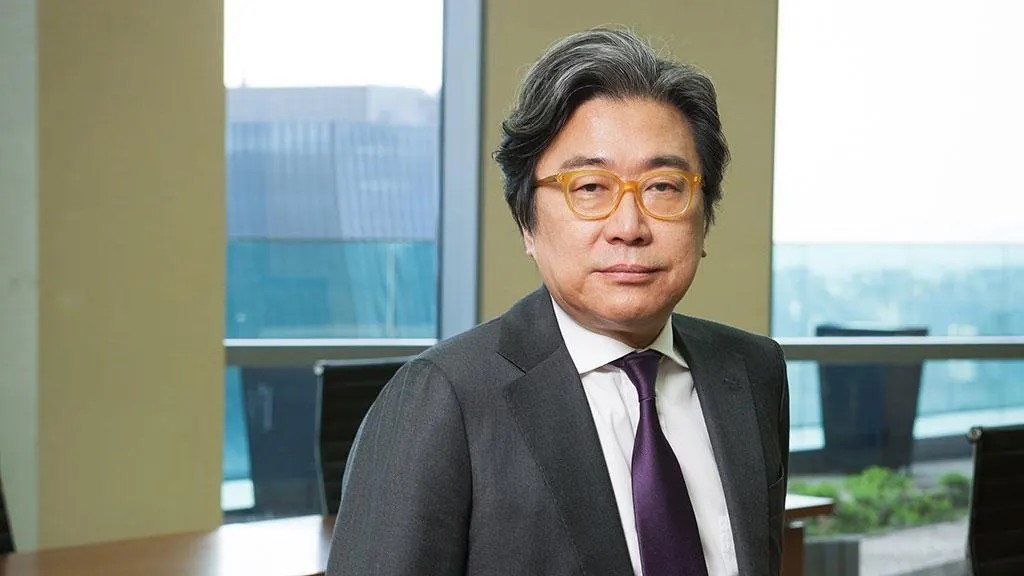
Cho Jung-ho ranks among the successful/richest Forex traders in South Korea, overseeing currency exposure through the institutional framework of Meritz Financial Group. As of 2025, his personal net worth is valued at $7.7 billion. He has served as president of the group since its formation in 2005, building a vertically integrated structure across insurance, brokerage, and asset management.
His direct involvement in the Forex market operates on three levels. First, Meritz Fire & Marine Insurance conducts reinsurance for international contracts denominated in foreign currencies, which requires the use of forward instruments. Second, Meritz Asset Management allocates capital in USD, JPY, and CNY through bonds, equity funds, and structured products with currency hedging. Third, Meritz Securities provides clients with access to multi-currency capital markets and facilitates derivative trading based on currency pairs.
This framework places his operations firmly within the scope of Forex financial trading success stories, where return is generated through strategic control of currency risk, reserve management, and multi-market exposure — not through direct speculative trading. His institutional role in managing foreign currency flows and building long-term profitability qualifies him as one of the top Forex traders in South Korea, operating through structural leverage rather than intraday volatility.
Park Hyeon-joo
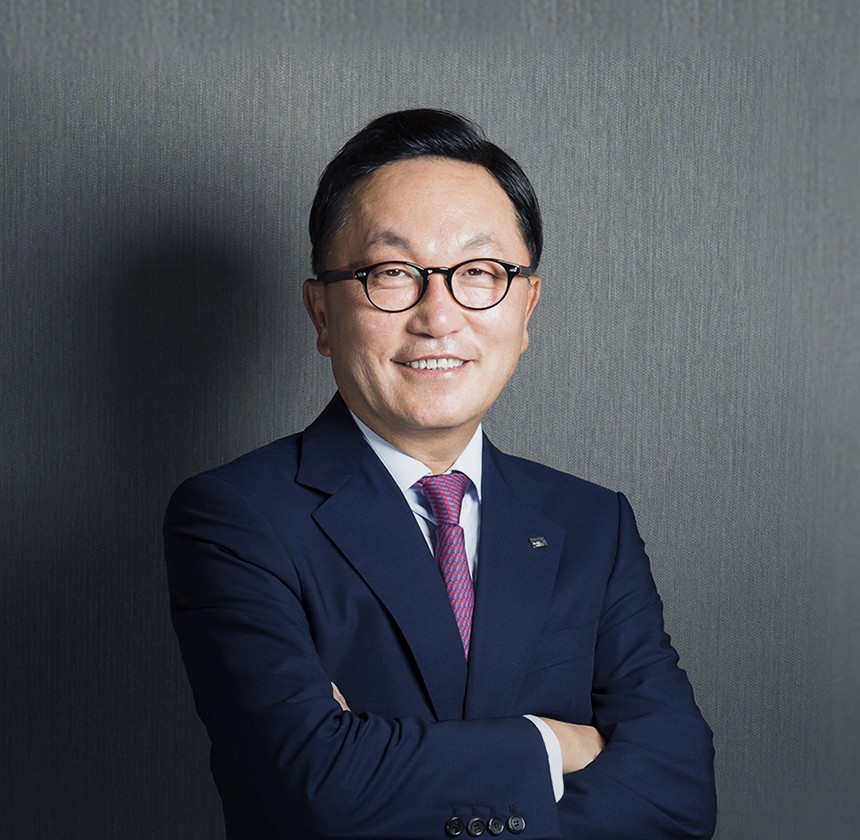
Park Hyeon-joo is considered one of the richest financial traders in South Korea as the founder of Mirae Asset Financial Group — one of the largest independent investment houses in Asia with active currency exposure across North American, European, and Indian markets. His net worth in 2024 is estimated at $1.1 billion. In 1998, he launched South Korea’s first public mutual fund, building the infrastructure for retail investors in a country where financial instruments had previously lacked broad access.
Mirae Asset builds its strategy around global capital allocation with direct currency exposure: portfolio investments in real estate, securities, and exchange-traded funds are conducted in US dollars, euros, Singapore dollars, and other highly liquid currencies. These operations require continuous currency hedging, base-currency valuation adjustments, and protection against interest rate shifts across major external markets. Altogether, this places Park Hyeon-joo within the profile of successful/richest Forex traders in South Korea in terms of institutional-scale currency flow management.
The asset management system at Mirae includes both passive and actively managed strategies, with a significant portion of holdings in currency-based ETFs and funds with dynamic hedging overlays. This demands regular interaction with the Forex market — through currency pair positions, capital placements with fixed exchange terms, and the use of forward contracts. In this context, his work aligns with Forex financial trading success stories, where outcomes are driven by architecture capable of responding to global volatility and reallocating capital in line with shifting currency yields.
Rogue Trader (YouTube: @Korean_Trader)
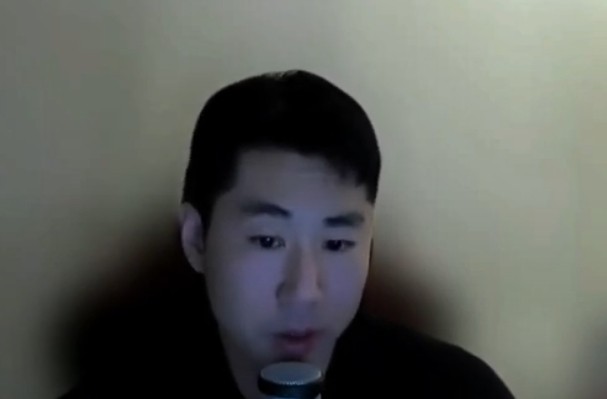
Rogue Trader is an active South Korean trader who publishes content in English, targeting a global audience. His channel documents real Forex trading sessions with a focus on execution, timing, and decision structure. The content is practical, strategy-oriented, and built around actual market activity. With consistent updates and trade walkthroughs, Rogue Trader represents an example of successful/richest Forex traders in South Korea in terms of transparency and applied individual trading.
His videos walk through the logic behind entries and exits on key currency pairs like GBP/USD, USD/JPY, and EUR/USD, integrating real-time technical analysis with macroeconomic triggers. Commentary frequently references dollar index movement, Fed releases, and liquidity imbalances. The structure of the channel aligns with the idea of Forex financial trading success stories, where outcomes depend not on isolated trades but on consistent system-based execution across market cycles.
Each session is published as a process: screen recordings include charting, execution platforms, and trader commentary, without edits or retrospective filtering. A separate segment of the content is dedicated to the mental aspects of trading. Rogue Trader often analyzes emotional reactions, behavioral biases, and mental resets between sessions, offering insight into the internal discipline required to sustain a live trading model.
| Name | Net worth (2025, est) | Role in Forex | Trading style | Public transparency | Additional facts |
|---|---|---|---|---|---|
| Michael B. Kim | $9.5B | Manages macro-level investments; indirect FX exposure via MBK Partners | Strategic acquisitions with macroeconomic focus | Low | Founded MBK Partners; ex-Goldman Sachs |
| Cho Jung-ho | $7.7B | Institutional risk management; exposure via Meritz Asset, Securities | Conservative hedging & institutional risk control | Low | Built vertically integrated Meritz Financial Group |
| Park Hyeon-joo | $1.1B | Currency allocation in global funds via Mirae Asset | Structured product investment with currency hedging | Low | Pioneered Korea’s mutual fund market in 1998 |
| Rogue Trader | Unknown | Active retail trader using technical analysis and live trading | Scalping, intraday cycles, psychological journaling | High (YouTube channel @Korean_Trader) | Operates anonymously; focuses on live execution and psychology |
Current legal framework and regulation in Korea
The Forex market in South Korea operates under a strict regulatory framework designed to ensure financial stability and protect investors. The primary regulatory bodies are the Financial Services Commission (FSC) and the Bank of Korea, which oversee broker activity and enforce compliance. The maximum leverage for retail traders is capped at 1:10, limiting the risk of excessive speculation. All trading must be conducted through licensed domestic brokers, which restricts access to international platforms. These measures aim to prevent capital outflow and maintain the stability of the national currency.
In recent years, the government has taken steps to liberalize the market. Since July 2024, interbank Forex trading hours have been extended to 2:00 A.M. local time, increasing liquidity and attracting foreign investors. In January 2025, new policies allowed registered foreign financial institutions to participate in currency transactions related to current account operations, including export-import settlements.
Opportunities and challenges for traders in Korea
South Korean traders face several challenges, including a limited choice of brokers and strict reporting requirements. However, the market also offers significant opportunities. High liquidity in major currency pairs such as USD/KRW and the availability of modern trading platforms make the market attractive to experienced participants. Additionally, government initiatives to extend trading hours and ease procedures for foreign participants have stimulated market activity.
Nonetheless, traders must account for potential risks stemming from currency volatility and regulatory changes. For instance, in the case of sharp fluctuations in the won's exchange rate, the government may intervene to stabilize conditions, directly impacting trading strategies.
Additional constraints arise at the behavioral and cultural level. Publicly disclosing trading activity in South Korea is associated with reputational and tax exposure. Even successful and experienced traders avoid sharing their names, photos, biographies, or performance metrics.
Although domestic regulations prohibit individuals from accessing international Forex markets through unlicensed brokers, many still engage in offshore trading via VPNs and multi-currency wallets. This creates a structural incentive for anonymity: publicly acknowledging such activity may trigger administrative consequences such as tax investigations or frozen accounts.
Furthermore, in Korean social norms, financial outcomes — especially large profits or losses — are considered private. As a result, most real-world trading experience remains inside closed ecosystems: Telegram groups, private Discord servers, and anonymous YouTube channels.
How to start Forex trading in South Korea
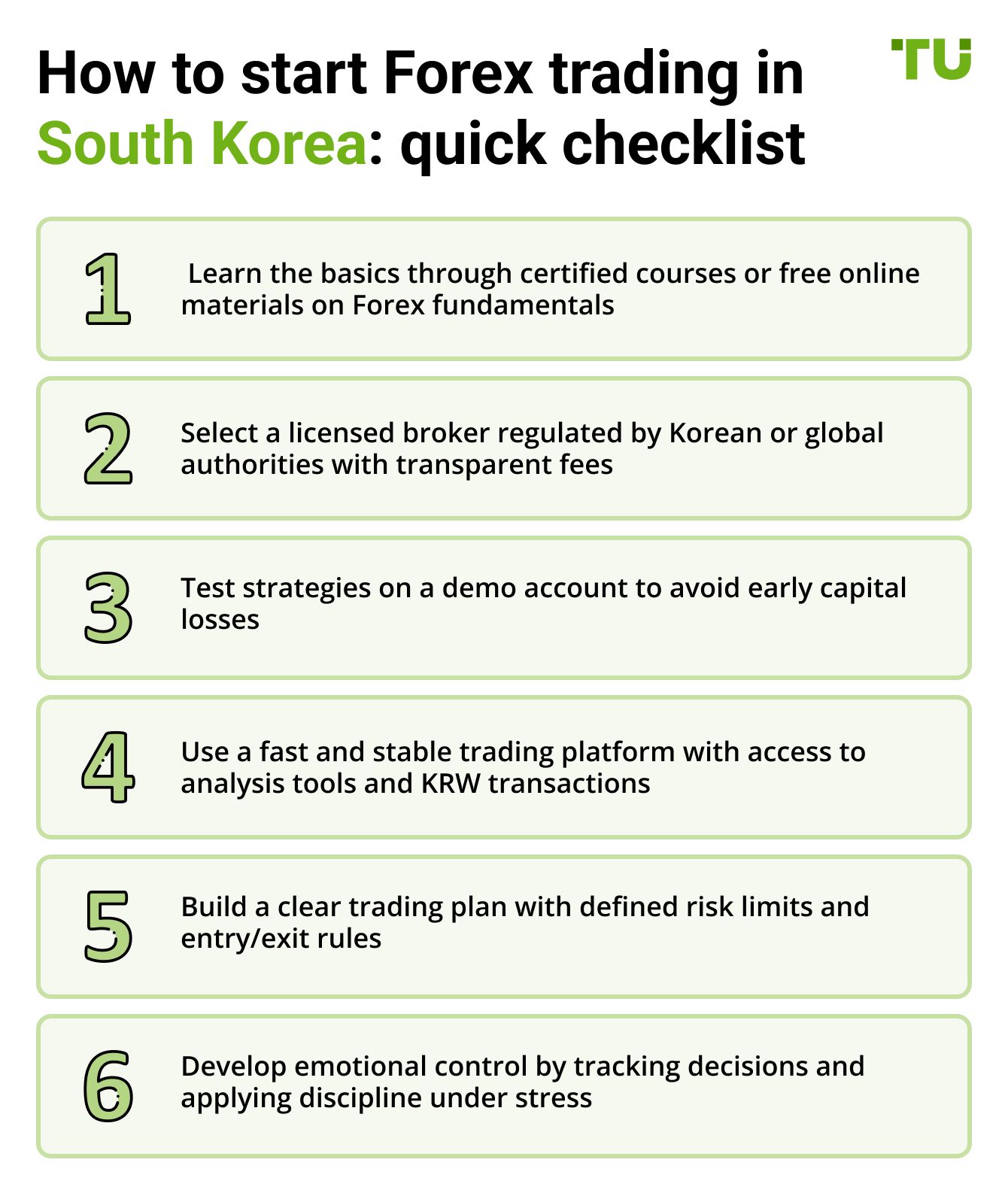
Starting in Forex trading requires a structured approach to education. In South Korea, specialized courses are available covering technical and fundamental analysis, risk management, and trading psychology. Educational platforms offer video tutorials and webinars targeted at beginners. For those who prefer self-study, free online courses are available, covering both theory and applied trading practices. These resources provide a foundation for engaging the market and building practical competency.
Choosing a reliable broker
Selecting a broker in South Korea must follow strict objective criteria. The top priority is licensing from financial regulatory authorities — brokers must operate under oversight from Korean or international regulators with verified jurisdiction. This minimizes legal risk and protects trader capital.
Additional criteria include commission structures: low spreads, transparent execution fees, and the absence of hidden charges. It is critical to confirm the broker offers platforms with high-speed order execution, stable connectivity, and integration with analytical tools. Secure deposit and withdrawal methods — particularly support for Korean bank accounts and KRW-based transactions — are also essential.
Technical reliability, 24/7 customer support, and access to educational materials in Korean or English complete the required set. Applying these criteria forms a stable basis for long-term trading.
| TU overall score | Min. deposit, $ | Max. leverage | Max. Regulation | ECN Spread EUR/USD | ECN Commission | Currency pairs | Open an account | |
|---|---|---|---|---|---|---|---|---|
| 9.1 | 100 | 1:500 | Tier-1 | 0,1 | 3,5 | 40 | Open an account Your capital is at risk. |
|
| 9 | 5 | 1:1000 | Tier-1 | 0,2 | 3,5 | 57 | Open an account Your capital is at risk. |
|
| 8.6 | 10 | 1:500 | Tier-1 | 0,2 | 3,5 | 60 | Open an account Your capital is at risk. |
|
| 8.7 | 10 | 1:2000 | Tier-1 | 0,1 | 3 | 100 | Open an account Your capital is at risk.
|
|
| 8.69 | 100 | 1:500 | Tier-1 | 0,3 | 3 | 55 | Open an account Your capital is at risk. |
|
| 8.43 | No | 1:500 | No | 0,1 | 3 | 61 | Open an account Your capital is at risk. |
Practice and discipline
Before switching to live accounts, it is recommended to use demo accounts to test strategies and understand market dynamics. Demo practice allows traders to build skills without the risk of capital loss. Creating a detailed trading plan — with clear goals, defined entry/exit rules, and capital management methods — supports consistency. Maintaining discipline in following that plan reduces impulsive behavior and reinforces decision control.
Trading psychology
Psychological factors play a central role in building a sustainable trading system. Managing emotions like fear and greed allows for rational decisions and reduces error frequency. Effective practices include maintaining a trading journal to track behavioral patterns. Traders also use stress management and focus techniques to operate under high volatility.
How Forex trading actually works in Korea: access, timing, and community
From my perspective, the future of Forex trading in South Korea lies at the intersection of structure, regulation, and behavioral discipline. The market is becoming more formalized — capped leverage, licensing requirements, reporting obligations — but these aren’t obstacles; they are filters. They separate impulsive risk-takers from informed capital managers.
In the Korean environment, where cultural norms discourage open exposure and financial success is often kept private, serious trading happens behind the scenes — in closed Telegram circles, vetted Discord servers, or semi-anonymous YouTube breakdowns. Public trading accounts and bragging posts have little value here. What matters is method repeatability.
Traders who study night-session volatility, especially during New York–Asia overlap, and build strategies around USD/KRW range behavior stand the best chance of scaling. I recommend mastering one pair before touching others, documenting at least 60 trades with controlled drawdowns, and avoiding offshore temptation until your system performs under regulated conditions.
In South Korea, the real trading edge doesn’t come from speed or leverage — it comes from execution clarity, quiet consistency, and risk control that you can prove. That’s what defines success now, and it’s how the next generation of elite Korean Forex traders will rise.
Conclusion
South Korea’s Forex landscape offers a rare fusion of institutional depth, regulatory discipline, and trader discretion — a combination that shapes a market both demanding and defensible. The most successful participants aren’t those chasing overnight returns, but those who quietly build systems that endure. Whether through strategic asset rotation, regulatory navigation, or adaptive intraday models, each trader profiled in this report represents a different expression of long-term resilience.
Their success underscores a broader truth: in South Korea, consistent profitability in Forex is not just a financial outcome — it’s a reflection of structure, intent, and precision. For those seeking to enter this space, the lesson is clear — mastery begins where speculation ends.
FAQs
How to become a successful trader in South Korea?
To become a successful trader in South Korea, start with structured education in technical and fundamental analysis, preferably through certified local institutions or global platforms. Focus on risk management, maintain disciplined trade execution, and stay compliant with financial regulations enforced by the Financial Supervisory Service (FSS).
Which instruments are most active during South Korea’s night hours?
Dollar-based pairs like USD/KRW and USD/JPY, along with gold and index futures, react strongly to U.S. economic news released in the evening Korean time.
Why do beginners often struggle with volatility?
They tend to overreact to weak signals in low-liquidity hours, leading to impulsive trades without structured plans or risk control.
How can traders detect and fix behavioral mistakes?
Keeping a detailed trading journal that logs emotional states and decision logic helps identify recurring patterns and refine discipline.
Related Articles
Team that worked on the article
Maxim Nechiporenko has been a contributor to Traders Union since 2023. He started his professional career in the media in 2006. He has expertise in finance and investment, and his field of interest covers all aspects of geoeconomics. Maxim provides up-to-date information on trading, cryptocurrencies and other financial instruments. He regularly updates his knowledge to keep abreast of the latest innovations and trends in the market.
Chinmay Soni is a financial analyst with more than 5 years of experience in working with stocks, Forex, derivatives, and other assets. As a founder of a boutique research firm and an active researcher, he covers various industries and fields, providing insights backed by statistical data. He is also an educator in the field of finance and technology.
As an author for Traders Union, he contributes his deep analytical insights on various topics, taking into account various aspects.
Mirjan Hipolito is a journalist and news editor at Traders Union. She is an expert crypto writer with five years of experience in the financial markets. Her specialties are daily market news, price predictions, and Initial Coin Offerings (ICO).






























































































































